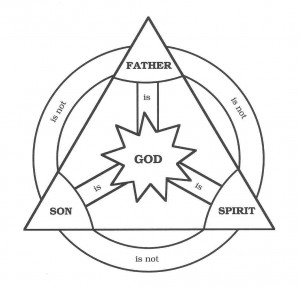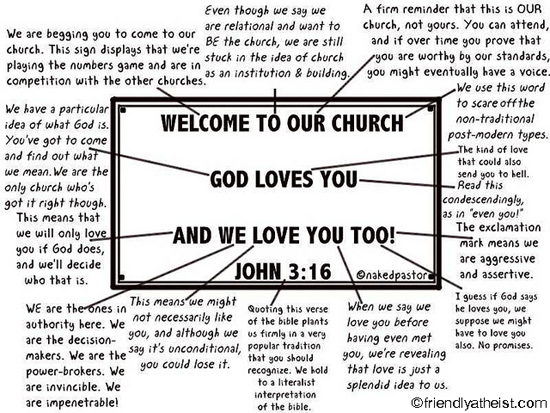The last couple weeks I have been working my way through dozens of Bible and theology questions which people have submitted through that “ask a question” area in the sidebar. Below is a question that made me laugh, not because it was a silly question (there’s no such thing), but because of how impossible it was to answer!

The reader essentially asked me to define the Trinity…
I want to know more about the Trinity. Thank you.
Below is the answer I sent back to the reader. Feel free to help me out with a better explanation of the Trinity in the comment section below.
Whew!
Asking me to explain or define the Trinity is almost like asking me to define God! An impossible task!
There is so much to discuss and talk about regarding the Trinity, it is hard to know where to begin or exactly what you want to know about the Trinity. So let me do my best to briefly explain and define the Trinity, and also explain why the Trinity is essential and important for Christian doctrine.
Define the Trinity
 First, the Trinity is best defined as “One God who exists in three persons.” There are not three Gods. There is only one God. But somehow, in ways beyond human comprehension, God exists in three persons, the Father, the Son, and the Holy Spirit.
First, the Trinity is best defined as “One God who exists in three persons.” There are not three Gods. There is only one God. But somehow, in ways beyond human comprehension, God exists in three persons, the Father, the Son, and the Holy Spirit.
There is no good analogy in creation, but some have likened the Trinity to the three forms of water, ice, water, and steam, while others have equated it to the light and heat of the sun. My personal preference (though again, it is a bad analogy) is how we as humans consist of body, soul, and spirit. We are one person with three parts. Of course, God does not consist of parts. Each person of the Trinity is fully God.
It is difficult to understand, but this is primarily because we are not God.
Explaining the Trinity to mortal human beings is like trying to explain colors to a blind man or sound to a deaf person. It like trying to use words to explain speech to a dog. You can bark at the dog, but that doesn’t help, and you can speak to a dog with words, but he won’t understand what you’re saying and will never be able to speak for himself.
Believing in the Trinity
So if the Trinity is so difficult to understand, why is it important to believe? There are probably thousands of reasons why the Trinity is critical to Christian thought, but there are three of the most important reasons. (Yes, I chose three simply because I am writing about the Trinity.)
1. First, the Bible teaches us that God exists as a Trinity.
No, the word “trinity” is never used in the Bible, but there are passages all over the place which reveal that there are three persons in the Godhead who exist together as one God.
We know, for example, that God is one (Deut 6:4; 1 Tim 2:5; 1 Cor 8:6; etc.), and yet Jesus, who most perfectly revealed God to us (John 14:7; Col 1:15; Heb 1:3) often spoke of His Father and of sending the Holy Spirit (e.g., John 10; John 14-17). Even at the baptism of Jesus, we see Jesus coming up out of the water and the Holy Spirit descending upon Him like a dove, and the Father speaking to Jesus from heaven (Matt 3:16-17).
There are numerous other passages, but the bottom line is that whether we understand it or not, the Bible teaches the reality of the Trinity (cf. Matt 28:19; 2 Cor 13:14; 1 Pet 1:2).
2. Second, the Trinity is important because it shows that God is relational and loving.
Christians believe that God does not change in His character or attributes. Yet think about what it would mean for God to not be a Trinity. If God did not exist as a Trinity, then prior to the creation of humans and prior to the creation of angels, God could not have lived in any form of loving relationship with anybody or anything.
Without the Trinity, God could not have lived for eternity in love or in relationship. The Trinity allows the loving and relational attributes of God to have eternally existed with God.
 Other monotheistic religions which have no concept of the Trinity have great trouble explaining or understanding how God could be loving and relational. Why? Because for most of God’s existence, there was no one to love other than himself.
Other monotheistic religions which have no concept of the Trinity have great trouble explaining or understanding how God could be loving and relational. Why? Because for most of God’s existence, there was no one to love other than himself.
In fact, it could be argued that if there was no Trinity, there could have been no creation whatsoever. Why not? Because if the Trinity did not exist, then God would not be relational (because there was no one to relate to), and hence, there would be no reason for God to create anything with which to relate. The only way a non-relational God would decided to create being to love and take care of was if He recognized that without other beings in the universe, He was lacking or deficient in some way. But then, this makes God less than God!
A non-Trinitarian God could not and would not create, unless He decided to become relational and loving, in which case, He would be admitting some sort of imperfection in His being.
It is much better to believe what the Bible teaches, that God is loving and relational and as such, has always existed in a loving relationship within the Trinity. As a result of this loving relationship, God decided to create other beings with which to share the loving relationship He already experienced within the Godhead.
3. This then leads us to the third reason the Trinity is important: Christians love others because God is love.
Christianity is an outward, loving, relational-focused way of living. Part of this is because we believe in the Trinity. In Genesis we read that God created us in His own image. There is a wide range of ideas on what this means, but one thing that is certainly included in the truth of being created in God’s image is that we were created for community. Just as God had an eternal relationship within the Trinitarian Godhead, so also, humans are to live in relationships with God and with one another.
The love that each member of the Godhead shares with the other members of the Trinity was also shared with humans when we were created. We love because He first loved us.
If there was no Trinity and yet somehow, God inexplicably decided to create humans, then it would be logical to say that love and community was not an essential character of God, and therefore, need not be an essential part of our life either. If God did not eternally exist in a loving Trinity, then we would not need to exist in love either.
So again, without a belief in the Trinity, we lose a belief in a loving God, and therefore, lost any reason to believe that God wants us to love others. If we are to act like God and God has existed without showing love toward others for most of eternity, then there is little reason to live in loving ways toward others now, for love would not be an essential characteristic or attribute of God.
I could go on and on, but I hope that this answer helps briefly explain and define the Trinity and show why belief in the Trinity is essential to Christian belief and practice.
If you want to weigh in, please feel free to add your comments below. Also, please consider sharing this post on Twitter and Facebook below because then others can benefit from the discussion on this theological question.





 When most people ask this question, they are primarily referring to the “400 years of silence” in between Malachi and Matthew. I will try to explain what was going on during those years, but really, the question of God’s so-called “years of silence” is much more complex.
When most people ask this question, they are primarily referring to the “400 years of silence” in between Malachi and Matthew. I will try to explain what was going on during those years, but really, the question of God’s so-called “years of silence” is much more complex.
 But God’s apparent silence throughout most of history is not because God was absent or inactive, but simply because it takes eyes of faith to see where God is at work even when He doesn’t have someone write about it.
But God’s apparent silence throughout most of history is not because God was absent or inactive, but simply because it takes eyes of faith to see where God is at work even when He doesn’t have someone write about it.
 It is often taught that Jesus obeyed the law perfectly because we cannot. Then we are told that when we believe in Jesus for eternal life, He give us His righteousness. He has such an infinite supply of righteousness, that He can pour some of it into us so that we also become righteous.
It is often taught that Jesus obeyed the law perfectly because we cannot. Then we are told that when we believe in Jesus for eternal life, He give us His righteousness. He has such an infinite supply of righteousness, that He can pour some of it into us so that we also become righteous.


 Sometimes this question is asked this way: “How could God know what it is like to lose a son if He knew Jesus was just going to rise from the dead three days later?” Or “How could the death of Jesus be a sacrifice for God if God knew that Jesus was just going to rise again from the dead?”
Sometimes this question is asked this way: “How could God know what it is like to lose a son if He knew Jesus was just going to rise from the dead three days later?” Or “How could the death of Jesus be a sacrifice for God if God knew that Jesus was just going to rise again from the dead?” Though I was taught in Bible college and Seminary that God is timeless, that He exists outside of time in a constant, eternal now, I don’t believe it. There are numerous reasons why, which I won’t get into here. I believe that God is relational and is capable of reacting to our needs and prayers in a way that would not be possible if He were outside of time.
Though I was taught in Bible college and Seminary that God is timeless, that He exists outside of time in a constant, eternal now, I don’t believe it. There are numerous reasons why, which I won’t get into here. I believe that God is relational and is capable of reacting to our needs and prayers in a way that would not be possible if He were outside of time.